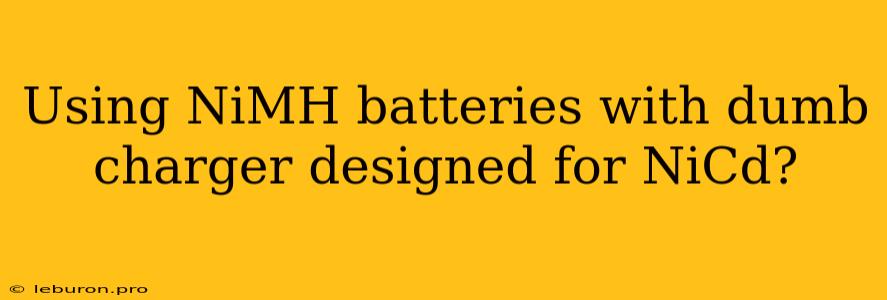Can You Use NiMH Batteries With a Dumb Charger Designed for NiCd?
While both Nickel-Metal Hydride (NiMH) and Nickel-Cadmium (NiCd) batteries are rechargeable, using them interchangeably with chargers designed for the other type can be a risky endeavor. While both types of batteries are similar in some aspects, they have distinct charging characteristics, and using a NiCd charger with NiMH batteries can lead to damage and potential safety hazards.
This article explores the differences between NiCd and NiMH batteries, the implications of using a NiCd charger with NiMH batteries, and provides guidelines for safe and effective charging practices.
Understanding NiCd and NiMH Batteries
Nickel-Cadmium (NiCd) Batteries
NiCd batteries have been popular for decades due to their robust nature and ability to withstand harsh environments. They offer high discharge rates and long cycle life. However, NiCd batteries have several drawbacks:
- Memory Effect: NiCd batteries can develop a "memory effect" if they are repeatedly recharged before being fully discharged. This effect reduces their capacity and lifespan.
- Toxicity: NiCd batteries contain cadmium, a heavy metal that is harmful to the environment.
- Low Energy Density: Compared to NiMH batteries, NiCd batteries have a lower energy density, meaning they store less energy for a given weight or size.
Nickel-Metal Hydride (NiMH) Batteries
NiMH batteries are a newer technology that offers several advantages over NiCd:
- Higher Energy Density: NiMH batteries store significantly more energy for the same size and weight compared to NiCd batteries.
- No Memory Effect: Unlike NiCd, NiMH batteries do not suffer from the memory effect.
- Environmentally Friendly: NiMH batteries do not contain cadmium and are considered more environmentally friendly than NiCd batteries.
- Faster Charging: NiMH batteries generally charge faster than NiCd batteries.
The Compatibility Issue
The main problem arises from the different charging characteristics of NiCd and NiMH batteries. NiCd chargers typically utilize a constant-current charging method, delivering a specific current to the battery until the voltage reaches a certain threshold. This method, while suitable for NiCd batteries, can be problematic for NiMH batteries.
Potential Risks of Using a NiCd Charger with NiMH Batteries
- Overcharging: NiCd chargers tend to overcharge NiMH batteries, leading to excessive heat generation, battery damage, and even fire hazards. NiMH batteries have a higher charging voltage than NiCd batteries, and a NiCd charger may not recognize this, resulting in excessive charging.
- Reduced Battery Life: Overcharging NiMH batteries can significantly shorten their lifespan, reducing the number of charge cycles they can endure.
- Battery Swelling: Excessive heat generated by overcharging can cause the battery to swell, potentially leading to leaks and safety risks.
Safe Charging Practices for NiMH Batteries
To ensure the safe and efficient charging of NiMH batteries, it is crucial to use a charger specifically designed for NiMH batteries. These chargers typically employ a combination of constant-current and constant-voltage charging methods, which are optimized for NiMH batteries. They also include features like temperature sensing and overcharge protection to prevent damage to the batteries.
Alternative Charging Methods
If you only have a NiCd charger, you can use alternative charging methods, but with caution:
- Lower Current Charging: You can reduce the charging current of the NiCd charger by using a resistor in series with the battery. This will lower the charging current, but it will also slow down the charging process.
- Manually Disconnecting: You can monitor the voltage of the NiMH battery during charging and manually disconnect the battery when it reaches its fully charged voltage. However, this requires constant monitoring and can be inconvenient.
Conclusion
Using a NiCd charger with NiMH batteries is not recommended due to the potential risks of overcharging and battery damage. Investing in a dedicated NiMH charger is the safest and most efficient way to charge these batteries. By understanding the differences between NiCd and NiMH batteries and following safe charging practices, you can ensure the longevity and safety of your NiMH batteries. Remember, using a NiCd charger with NiMH batteries carries inherent risks and can lead to battery damage, shortened lifespan, and potential safety hazards. It's essential to use a NiMH charger specifically designed for these batteries for optimal performance and safety.
